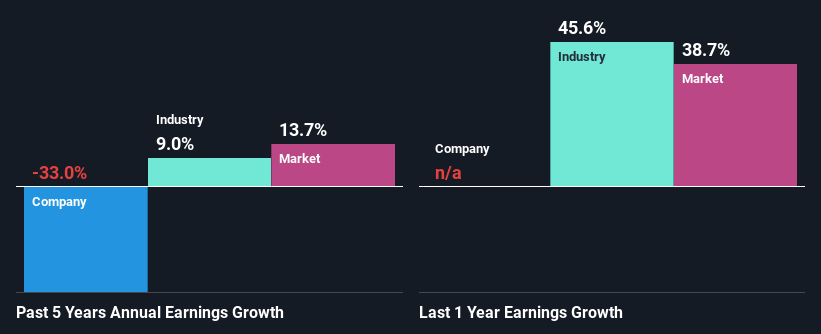Can Acadia Realty Trust's (NYSE:AKR) Weak Financials Pull The Plug On The Stock's Current Momentum On Its Share Price?
Acadia Realty Trust (NYSE:AKR) has had a great run on the share market with its stock up by a significant 7.8% over the last month. However, we decided to pay close attention to its weak financials as we are doubtful that the current momentum will keep up, given the scenario. In this article, we decided to focus on Acadia Realty Trust's ROE.
ROE or return on equity is a useful tool to assess how effectively a company can generate returns on the investment it received from its shareholders. Simply put, it is used to assess the profitability of a company in relation to its equity capital.
See our latest analysis for Acadia Realty Trust
How Is ROE Calculated?
ROE can be calculated by using the formula:
Return on Equity = Net Profit (from continuing operations) ÷ Shareholders' Equity
So, based on the above formula, the ROE for Acadia Realty Trust is:
1.2% = US$25m ÷ US$2.1b (Based on the trailing twelve months to December 2021).
The 'return' is the income the business earned over the last year. Another way to think of that is that for every $1 worth of equity, the company was able to earn $0.01 in profit.
Why Is ROE Important For Earnings Growth?
We have already established that ROE serves as an efficient profit-generating gauge for a company's future earnings. Based on how much of its profits the company chooses to reinvest or "retain", we are then able to evaluate a company's future ability to generate profits. Assuming all else is equal, companies that have both a higher return on equity and higher profit retention are usually the ones that have a higher growth rate when compared to companies that don't have the same features.
Acadia Realty Trust's Earnings Growth And 1.2% ROE
It is quite clear that Acadia Realty Trust's ROE is rather low. Not just that, even compared to the industry average of 6.2%, the company's ROE is entirely unremarkable. Therefore, it might not be wrong to say that the five year net income decline of 33% seen by Acadia Realty Trust was possibly a result of it having a lower ROE. We believe that there also might be other aspects that are negatively influencing the company's earnings prospects. For example, the business has allocated capital poorly, or that the company has a very high payout ratio.
So, as a next step, we compared Acadia Realty Trust's performance against the industry and were disappointed to discover that while the company has been shrinking its earnings, the industry has been growing its earnings at a rate of 9.0% in the same period.
Earnings growth is an important metric to consider when valuing a stock. What investors need to determine next is if the expected earnings growth, or the lack of it, is already built into the share price. This then helps them determine if the stock is placed for a bright or bleak future. Is AKR fairly valued? This infographic on the company's intrinsic value has everything you need to know.
Is Acadia Realty Trust Making Efficient Use Of Its Profits?
Acadia Realty Trust seems to be paying out most of its income as dividends judging by its three-year median payout ratio of 71% (meaning, the company retains only 29% of profits). However, this is typical for REITs as they are often required by law to distribute most of their earnings. So this probably explains the company's shrinking earnings.
Moreover, Acadia Realty Trust has been paying dividends for at least ten years or more suggesting that management must have perceived that the shareholders prefer dividends over earnings growth. Our latest analyst data shows that the future payout ratio of the company is expected to drop to 51% over the next three years. As a result, the expected drop in Acadia Realty Trust's payout ratio explains the anticipated rise in the company's future ROE to 2.1%, over the same period.
Summary
On the whole, Acadia Realty Trust's performance is quite a big let-down. Because the company is not reinvesting much into the business, and given the low ROE, it's not surprising to see the lack or absence of growth in its earnings. Additionally, the latest industry analyst forecasts show that the company is expected to continue to see a similar decline in its earnings in the future as well. Are these analysts expectations based on the broad expectations for the industry, or on the company's fundamentals? Click here to be taken to our analyst's forecasts page for the company.
Have feedback on this article? Concerned about the content? Get in touch with us directly. Alternatively, email editorial-team (at) simplywallst.com.
This article by Simply Wall St is general in nature. We provide commentary based on historical data and analyst forecasts only using an unbiased methodology and our articles are not intended to be financial advice. It does not constitute a recommendation to buy or sell any stock, and does not take account of your objectives, or your financial situation. We aim to bring you long-term focused analysis driven by fundamental data. Note that our analysis may not factor in the latest price-sensitive company announcements or qualitative material. Simply Wall St has no position in any stocks mentioned.

 Yahoo Movies
Yahoo Movies 

